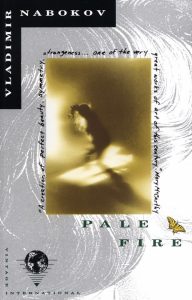
In Austin I had two good friends who were the most well-read people I had ever met until then. I’ve spoken briefly in this space about one of them, Mike Godwin, now a staff counsel for the Electronic Freedom Foundation and WELL gadfly. The other was Kathy Strong, who was married to Mike for a while. I briefly shared an apartment with Kathy, and I can easily recall the books lying around the house. It was she (along with Dwight Brown) who piqued my interest in Rex Stout’s Nero Wolfe novels. But it is the other books–on tables, chairs, bookshelves, and stairs–that I’m thinking of now, books by Robertson Davies, Italo Calvino, and Vladimir Nabokov. I think back on this and wonder why is it only now that I am reading these books when they were clearly being recommended to me by someone whose tastes in literature I admired. I cannot remember, but did I try these books at that time and was not mature enough a reader to grasp their worth? Were there other authors about that I should remember today?
The occasion for these reminiscences is having just finished Nabokov’s Pale Fire, which I can only describe as “my kind of book.” It is not a novel, although by the end you have pieced together a larger story that would not have been out of place in a novel. Nor is it poem, critical work, or index, although it contains all three of these elements. I guess if one must label it, it is “experimental” fiction.
Although the form is most unusual and does hold all appeal for me, the true pull of this work is the character of the narrator, a rogue and totally questionable source of information. His poor victims, the long-suffering poet, John Shade, and Shade’s wife Sylvia, one must feel kindly towards, especially knowing the intensity of the dedicated fan.
I refrain from talking too much about the actual plot, although it is not necessarily a mystery. Instead I hasten to compare this work with Borges in that the creation of a European kingdom recalls his “Tlon, Uqbar, Orbis Tertius.” It also reminds me of that nation that Nero Wolfe is supposed to be from (or was that an actual kingdom? I never checked to see.)
This was my first go at Nabokov, and I suppose by my reaction to it, I should not stay too long from his other work. What shall it be: Ada? Lolita? The Collected Stories?
[Finished 18 September 1997]
